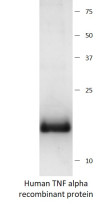ARG70479
Human TNF alpha recombinant protein (His-tagged)
Human TNF alpha recombinant protein (His-tagged) for SDS-PAGE
Overview
| Product Description | HEK293 expressed, His-tagged Human TNF alpha recombinant protein. |
|---|---|
| Tested Application | SDS-PAGE |
| Target Name | TNF alpha |
| Species | Human |
| A.A. Sequence | Val77 - Leu233 |
| Expression System | HEK293 |
| Protein Full Name | Tumor necrosis factor |
| Alternate Names | TNF; Tumor Necrosis Factor; TNF-Alpha; TNFSF2; TNFA; DIF; Tumor Necrosis Factor Ligand Superfamily Member 2; TNF-A; Tumor Necrosis Factor (TNF Superfamily, Member 2); Tumor Necrosis Factor Ligand 1F; Tumor Necrosis Factor-Alpha; Tumor Necrotic Factor Alpha; TNF Superfamily, Member 2; TNF, Macrophage-Derived; TNF, Monocyte-Derived; APC1 Protein; Cachectin; TNLG1F |
Properties
| Form | Powder |
|---|---|
| Purification Note | Endotoxin level is less than 0.1 EU/µg of the protein, as determined by the LAL test. |
| Purity | > 95% (by SDS-PAGE) |
| Buffer | PBS (pH 7.4) |
| Reconstitution | It is recommended to reconstitute the lyophilized protein in sterile water to a concentration not less than 200 μg/mL and incubate the stock solution for at least 20 min at room temperature to make sure the protein is dissolved completely. |
| Storage Instruction | For long term, lyophilized protein should be stored at -20°C or -80°C. After reconstitution, aliquot and store at -20°C or -80°C for up to one month. Storage in frost free freezers is not recommended. Avoid repeated freeze/thaw cycles. Suggest spin the vial prior to opening. |
| Note | For laboratory research only, not for drug, diagnostic or other use. |
Bioinformation
| Gene Symbol | TNF |
|---|---|
| Gene Full Name | tumor necrosis factor |
| Background | This gene encodes a multifunctional proinflammatory cytokine that belongs to the tumor necrosis factor (TNF) superfamily. This cytokine is mainly secreted by macrophages. It can bind to, and thus functions through its receptors TNFRSF1A/TNFR1 and TNFRSF1B/TNFBR. This cytokine is involved in the regulation of a wide spectrum of biological processes including cell proliferation, differentiation, apoptosis, lipid metabolism, and coagulation. This cytokine has been implicated in a variety of diseases, including autoimmune diseases, insulin resistance, psoriasis, rheumatoid arthritis ankylosing spondylitis, tuberculosis, autosomal dominant polycystic kidney disease, and cancer. Mutations in this gene affect susceptibility to cerebral malaria, septic shock, and Alzheimer disease. Knockout studies in mice also suggested the neuroprotective function of this cytokine. [provided by RefSeq, Aug 2020] |
| Function | Cytokine that binds to TNFRSF1A/TNFR1 and TNFRSF1B/TNFBR. It is mainly secreted by macrophages and can induce cell death of certain tumor cell lines. It is potent pyrogen causing fever by direct action or by stimulation of interleukin-1 secretion and is implicated in the induction of cachexia, Under certain conditions it can stimulate cell proliferation and induce cell differentiation. Impairs regulatory T-cells (Treg) function in individuals with rheumatoid arthritis via FOXP3 dephosphorylation. Up-regulates the expression of protein phosphatase 1 (PP1), which dephosphorylates the key 'Ser-418' residue of FOXP3, thereby inactivating FOXP3 and rendering Treg cells functionally defective. Promotes osteoclastogenesis and therefore mediates bone resorption. [Uniprot] |
Images (1) Click the Picture to Zoom In






